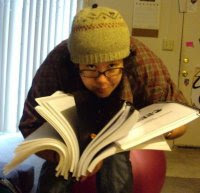For those who may now know it, Rain is the name of the game in many parts of the Pacific Northwest. Newport Oregon for example receives an average annual rainfall of 68 inches. Here in the Willamette Valley however we receive an average of 42 inches per year. This is not drastically different from the annual precipitation back in Blackstone Ma (48 inches). The main difference here is that our average winter temperature in Corvallis is near 40 F compared to Blackstone's 22ish degrees.
A late summer downpour has inspired me to start seriously thinking about how I intend to confront the coming winter. I want to grow crops all winter since the weather is so nice, but what I will need to do is construct some sort of rain rerouting system to keep the plants from drowning. I'm open to thoughts and suggestions.
It's all about water and food these days. My thoughts seem to continually run back to the basics, the most basic of basics. Having enough to no longer need to fret about supply (as back in the living in a van days) the real concern now is quality. Most recently I've been thinking about Genetically Engineered or Genetically Modified foods (GE, GM, GMOs). This practice is so disconcerting.
I've been disturbed by GMOs since the late 1990's, but I suppose I never imagined that they would become so prolific and nearly inescapable. Recent reports that even Organic products like veggie dogs and cereals have been contaminated with GMOs are distressing. These companies are trying to avoid GMOs but can't.
Furthermore it seems as though there is little control over inadvertent hybridization between GMO and non-GMO crops.
Solution? I don't have one. For me the ideal solution is radical. Stop GMO production altogether and/or mandatory labeling on all products containing GMOs (this of course doesn't even take into account all of the international implications of GMO agribusiness).
Barring this I feel as though organic and local is the best bet. All Local eating is a major challenge but one that I may undertake soon if only for my own piece of mind.
GMO Labeling: Threat Or Opportunity?
Peter W.B. Phillips and Grant Isaac
University of Saskatchewan, Canada
AgBioForum
GMO Labeling: Threat Or Opportunity?
Peter W.B. Phillips and Grant Isaac
University of Saskatchewan, Canada
AgBioForum


1 comments:
your making me crazy.please i understand the man is killing us,but please relax nobody gets out alive. what is all that rain putting on your plants? more polution most likley.think happy peaceful thoughts before you end up in a mental ward you may end up eating dog shit and deep fried rat. calm meditate. peace
Post a Comment